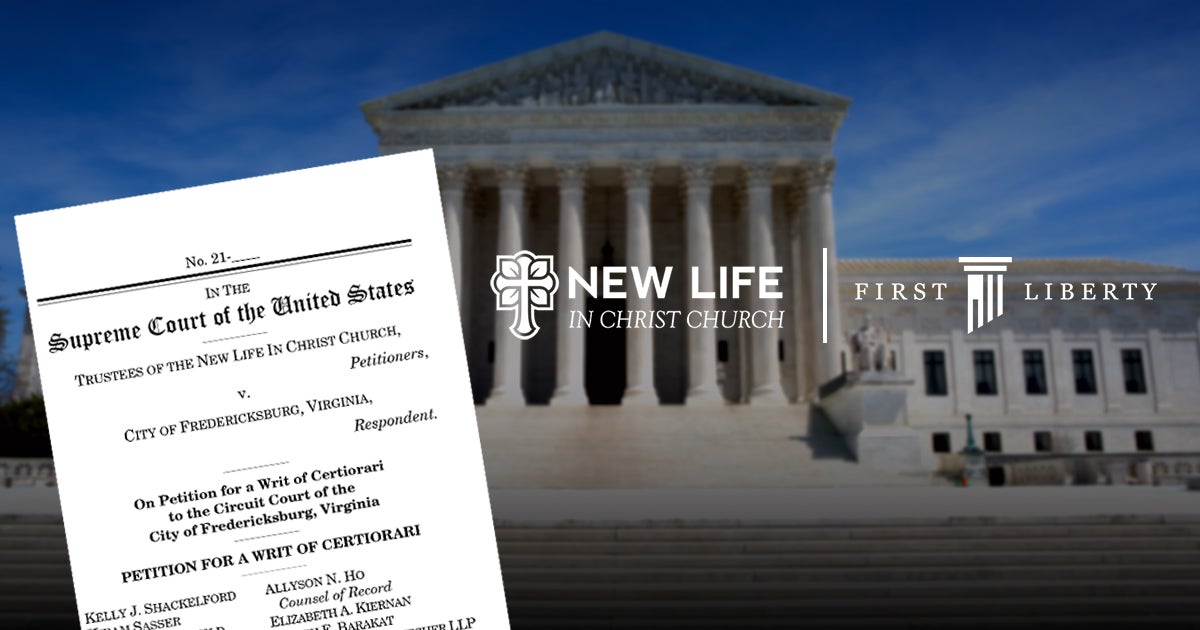
by Liberty McArtor • 5 min read
This week, First Liberty Institute filed a petition asking the U.S. Supreme Court to reverse a municipal court decision that denied tax-exempt status to a Virginia church.
The case began when the City of Fredericksburg denied a parsonage tax exemption to New Life in Christ Church because, according to city officials, the married couple that lives in the house provided by the church on a college campus do not qualify as “ministers.”
In the brief, our attorneys argue that houses of worship must be free to decide for themselves who is a minister.
“The city’s own interpretation of this church’s doctrine and what is a minister unnecessarily requires the government to delve into issues of faith and doctrine in a way that violates the First Amendment,” said First Liberty President Kelly Shackelford.
Unconstitutional Interference
New Life in Christ Church is located near the University of Mary Washington. As the church’s college campus ministers, Josh and Anacari Storms conduct regular outreach to those at the university by hosting Bible studies and worship services at the parsonage where they live.
The City of Fredericksburg decided to deny the parsonage tax exemption that is usually granted to churches, however, because it determined that Josh and Anacari are not actually ministers. Then, the City argued that the couple do not even qualify as ministers under the Presbyterian Book of Church Order. A state court declined to hear the church’s appeal.
First Liberty, working with the Christian Legal Society and attorneys from Gibson, Dunn & Crutcher LLC, argue that the City is violating the First Amendment by involving itself in a church’s leadership decisions. In fact, government officials are constitutionally prohibited from reviewing religious texts like the Presbyterian Book of Church Order and making theological determinations.
“For over 150 years, the Supreme Court has protected the rights of churches to determine in good faith who serves as their ministers,” said Allyson Ho, partner at Gibson, Dunn & Crutcher, and veteran Supreme Court advocate. “The New Life Church deserves that same protection.”
“Government officials have no right to substitute their theology for that of the church,” Shackelford said. “New Life in Christ Church considers its college campus ministers’ actions to be essential functions of the ministry of the church, and the city should abide by that decision.”
Protecting Church Autonomy
First Liberty has defended church autonomy at the Supreme Court in the past.
In 2020, the Supreme Court ruled in favor of religious freedom in Our Lady of Guadalupe v. Morrissey-Berru. In the case, the Court sided with two Catholic schools defending themselves against employment discrimination claims by their former teachers. That ruling further defined and secured the “ministerial exception,” a legal doctrine protecting religious organizations’ right to choose their leaders, ministers and teachers.
First Liberty filed an amicus (friend-of-the-court) brief in that case, arguing on behalf of the schools that protecting the right of churches and religious organizations to choose who teaches the faith is one of the core principles of the First Amendment.
First Liberty also litigated a similar case in Puerto Rico (a U.S. territory where the Constitution also applies). A few years ago, Puerto Rico’s highest court issued a troubling ruling that essentially restructured Catholic-affiliated entities, a clear violation of the First Amendment and the church autonomy doctrine. The U.S. Supreme Court reversed the Puerto Rico court’s decision in 2020 and sent it back for further review.
In both cases, America’s highest court upheld the constitutionally protected independence of religious organizations. With the New Life in Christ Church case, the Supreme Court has yet another opportunity to strengthen that protection and make it clear that government may not interfere with the affairs of religious organizations and houses of worship.